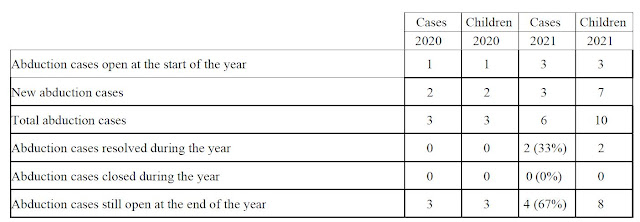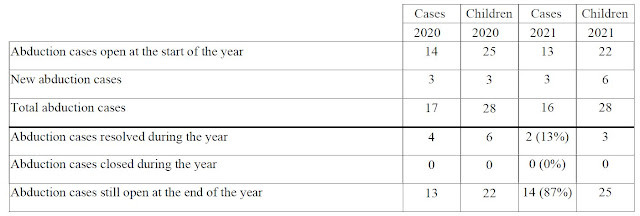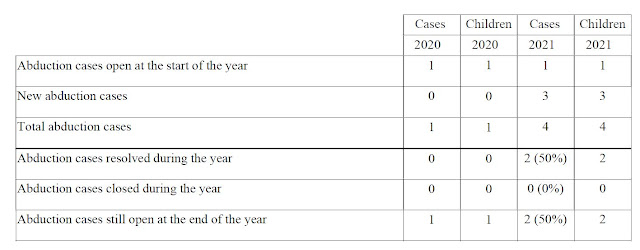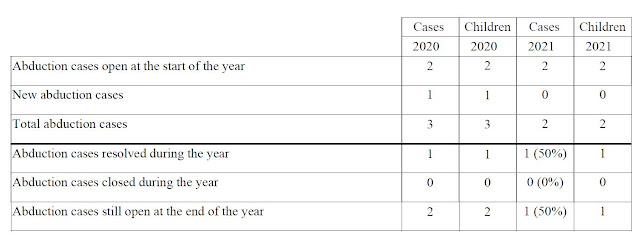by
Jeremy D. Morley[1]
A
Connecticut court has refused to enforce a custody order of the United Arab
Emirates on the ground that the order is repugnant to Connecticut public policy.
The UAE court awarded custody of two children to their father because they and
the father are Muslim while the mother is Christian. Al Namani v. Watson,
Superior Court, Hartford, Connecticut, May 31, 2022 (unreported)[2].
Specifically,
the UAE court summarized the reasons for its decision as follows:
“As
per the documents and papers, daughter … is 11 years old and son … is 9 years old. The
plaintiff is still Christian as per the statement of claim. The Personal Status
Law stipulates that the custodial patent’s [sic] religion shall be the same as
the child's religion and her custody shall be until the child becomes five years
old whether a male or female. Accordingly, the court cancels her right of child
custody of [the children], the father shall be the custodial parent and all alimony
and child support shall be cancelled effective from the date of granting him
the custody.”
After
judgment was issued, the mother removed the children from the UAE without their
father’s consent and brought them to her family home in Connecticut. The father
then sought to register and enforce the UAE order in Connecticut pursuant to
Connecticut's version of the Uniform Child Custody Jurisdiction and Enforcement
Act (the “UCCJEA”), Connecticut General Statutes, §46b-115 et seq. He
argued that, because the children had been living in the UAE for more than six
months immediately preceding the commencement of a case in that country for
divorce and then a case for custody, the UAE was the children’s home state. He
further argued that the UAE courts had continuing and exclusive child custody jurisdiction,
since he continued to live there. Accordingly, he asserted that the UCCJEA
required the Connecticut courts to register and enforce the UAE custody order,
and that they had no right to modify it.
The
mother opposed registration pursuant to General Statutes, §46b-115ii. That
section provides that a court in Connecticut must treat a foreign child custody
determination “as a child custody determination of another state … unless such
determination was rendered under child custody law which violates fundamental
principles of human rights or unless such determination is repugnant to the
public policy of this state.”
Significantly,
Connecticut's statutory provision is unique to that state, despite the fact
that Connecticut generally adopted the standard version of the UCCJEA that was
promulgated by the Uniform Law Commissioners. That version provides that, “A
court of this State need not apply this [Act] if the child custody law of a
foreign country violates fundamental principles of human rights.” When it
adopted the Act, Connecticut chose to expand the so-called “escape clause” by
adding a second and distinct basis for a refusal, which is that of repugnance
to state public policy of enforcing a foreign custody order.
In
his ruling, Judge Daniel J. Klau determined the public policy of
Connecticut concerning child custody matters by reviewing the Connecticut statutes
and case law on that issue. He cited the statutory provisions (General Statutes
§46b-56(b) and (c), which require the application of the “best interests of the
child” and extensive caselaw establishing “the clearly defined public policy of
our state that family courts must make child custody determinations according
to the best interests of the child.”
The
judge then reviewed the UAE custody order and ruled that it was repugnant to
Connecticut public policy because it expressly stated that its decision was
based on the mother’s status as a Christian, whereas the father and the
children were Muslims,. The fact that the UAE child custody statute contained a
provision which mentioned the best interests of the child was not significant
because the judgment, as written, was based solely on religion.
The
father’s claim that the mother waved the public policy argument by having
initiated a divorce case in the UAE several years prior was held to be unpersuasive
because any such waiver by a litigant would not and could not bind the state
court, which is “entitled, nay obligated to resist the invitation to become the
instrument by which party seeks to enforce a judgment that is repugnant to
public policy.”
In
several cases in other states that do not have a public policy exception in their
state statutes, courts have nonetheless relied on public policy to preclude
recognition of foreign country custody rules. Merely by way of example, see:
In re Marriage of Donboli, 128 Wash. App. 1039 (2005) (barring
recognition of Iranian order that did not consider child's best interest). J.A.
v. A.T., 404 N.J. Super. 132, 960 A.2d 795 (App. Div. 2008) (barring
recognition of a Greek order that did not properly consider child's best
interest); and H.L.K. v. F.A.A., 2015 WL 5971123 (Pa. Super. Ct., 2015)
(Saudi order based on age, gender, and religion was inherently violative of
Pennsylvania public law).
For
more on this issue, see Jeremy
D. Morley, International Family Law Practice, § 7.28.
The
Connecticut case is also significant for its analysis of the meaning of the
“escape clause” provision that a foreign country order must be enforced “unless such determination was rendered under
child custody law which violates fundamental principles of human rights.” Other
courts have held that that language limits a court to analyzing the foreign law
as it is written, rather than the law as it is applied in the foreign country,
even if the law reads well but is applied in a manner violative of fundamental
human rights. That position is supported by the official comment to the
relevant section of the UCCJEA, which states that “the court's scrutiny should
be on the child custody law of the foreign country and not on other aspects of
the other legal system.” Indeed, in Matter of Yaman, 105 A.3d 600,
611 (N.H. 2014), the Supreme Court of New Hampshire held that “[t]he comments
to the UCCJEA . . . clarify that the analysis is meant to focus on the foreign
jurisdiction's substantive law, and not its legal system or how the law is
implemented.” 105 A.3d at 611.
However,
Judge Klau disagreed. He cited with approval the case of Coulibaly v.
Stevance, 85 N.E.3d 911 (Ind. Ct. App. 2017). There, the Indiana Court of
Appeals had insisted that, “we do not believe that the UCCJEA limits the courts
of this state to considering the foreign jurisdiction's law only on its face,
without regard to whether that law was applied in a manner violative of
fundamental human rights. One can imagine multiple circumstances in which a
foreign jurisdiction's custody law is unobjectionable as written, but applied
in a manner that clearly violates a parent's or child's fundamental human
rights.”
Judge
Klau concurred with Coulibaly since, “to hold otherwise would make the
court a party to the enforcement of a judgment which, on its face, violates
public policy or fundamental human rights.” Judge Klau then supported that argument with an
appropriate caution. He sensibly opined that courts should “be reticent to make
broad judgment about whether a foreign country’s laws violate fundamental
principles of human rights or are repugnant to the public policy of the court’s
state. It is one thing for a state court to opine on a particular judgment of a
foreign court. It is another thing entirely for a state court to opine on a
foreign country’s system of law in general.”
In conclusion, the Al
Namani v. Watson case demonstrates a sensible application
of the use of public policy and common sense to prevent the otherwise-automatic
obligation to enforce most foreign country custody orders issued by a home
state court that are based on norms that offend human rights or the standards
of the forum state.
[1]
Mr. Morley is a New York lawyer who concentrates on international family law
and consults with attorneys and clients globally on international family law
matters, always with local counsel as appropriate and necessary. He may be
reached at ww.interational-divorce.com
[2] The
author provided substantial assistance on the case to defendant’s counsel, Dara
P. Goings of West Hartford, Connecticut.



























